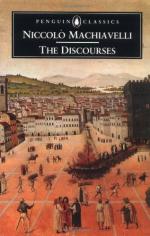
|
| Name: _________________________ | Period: ___________________ |
This test consists of 15 multiple choice questions and 5 short answer questions.
Multiple Choice Questions
1. What did Roman historian Livius call Necessity?
(a) THE CONSCIOUSNESS OF FREEDOM.
(b) THE MOTHER OF INVENTION.
(c) NECESSITY IS BUT AN INTERPRETATION.
(d) THE LAST AND BEST WEAPON.
2. To whom did Machiavelli refer to demonstrate the value of poverty on the character of leadership?
(a) Claudius.
(b) Caesar.
(c) Cincinnatus.
(d) Brutus.
3. What does Machiavelli believe comes to a good army without a good Captain?
(a) It becomes insolent and dangerous.
(b) It regroups and promotes its most virtuous member.
(c) It sells itself to the highest bidder.
(d) It breaks apart and goes home.
4. Why does Machiavelli believe that leaders of his time refuse to follow the examples of dealing with tumults set by leaders of ancient times.
(a) They were too easily influenced by women.
(b) They did not have the power of the Romans.
(c) They did not have the virtu of the Romans.
(d) They regard the judgments of ancient leaders to be inhuman and impossible to apply.
5. What does Machiavelli consider one of the most important reasons the Roman Empire was successful in expanding its borders?
(a) It had laws that kept the Plebes in their place.
(b) It kept Citizens in poverty.
(c) It showed skill in placing Nobles in control over colonies.
(d) The Senate gave great authority to military leaders over Cities that Rome was attacking.
6. According to Machiavelli, what is the sign of a truly powerful Republic?
(a) It can intimidate other Cities to become part of it without fighting battles.
(b) It does not take land or gain support with money, but through the virtue of its army and war.
(c) It has the wealth to buy other lands.
(d) It has the diplomatic skill to cajole the support of other Republics.
7. What are Machiavelli's two thoughts on fortresses?
(a) They build confidence and demonstrate power.
(b) They are important for protection and wise for storing armaments.
(c) They are costly and hard to maintain.
(d) They are not necessary and harmful.
8. What is the reason Machiavelli claims Princes with weaker armies would rush into battle?
(a) Such Princes are deluded over their power.
(b) Such Princes face no alternative.
(c) Because a long war would be harmful to all his subjects.
(d) Because their judgment was hindered by the situation.
9. Why does Machiavelli consider men prudent for considering the proverb he cites at the beginning of Book 2, Section 49?
(a) Because Machiavelli believes, "only the fool says there is no God."
(b) Because Machiavelli believes, "for all the things of the world in every time have had the very resemblance as those of ancient times.
(c) Because Machiavelli believes, "Men are too quick to neglect the achievements of their fathers."
(d) Because Machiavelli believes, "It is better to know where you have been to know what direction you are going."
10. What does Machiavelli name as the reason that good men cannot accomplish good for his country?
(a) They are at war.
(b) Envy of other men.
(c) The lack of methods to pass down customs.
(d) Incompetence.
11. What does Machiavelli consider the most useful possession for the defense of a Republic?
(a) Harsh Captains.
(b) A good army.
(c) Wise diplomats.
(d) Strong fortresses.
12. According to Machiavelli, what prevented the ambitions of the Nobles from corrupting Rome?
(a) Wars drained their wealth.
(b) The expanded Empire required that they move to colonies to lead them.
(c) The power of the Tribunes and the Plebes.
(d) Social ostracism by the Senate.
13. What does Machiavelli praise of the ancient Roman battlefield tactics?
(a) The ability of the three divisions to outman enemies and scare them from the battlefields.
(b) The fierceness of the soldiers to dictate the terms of every battle.
(c) The ability of the first division to puncture enemy lines so the second and third divisions can over run the command centers.
(d) The ability of the second and third divisions to absorb fallen lines ahead of them and proceed in battle.
14. What does Machiavelli believe to be important to extending the life of what he calls "mixed bodies" (Republics and Sects)?
(a) Providing the means from the state to keep them secure.
(b) Staying in a continual state of war.
(c) Returning to their original principles.
(d) Keeping turmoil alive between common masses.
15. What does Machiavelli recommend as the three ways to restore a divided city?
(a) Build a wall between the combatants, place soldiers between their neighborhoods, and prevent them from passing among each other.
(b) Dividing the city's wealth among the factions, sending them to colonies, conscripting them to the military.
(c) Kill the leaders of tumults, remove them from the city, or have them make peace.
(d) Kill the leaders, conscript the men to the military, take the women into slavery.
Short Answer Questions
1. What does Machiavelli recommend that prudent men avoid?
2. How did Phillip of Macedonia avoid battles with Fabius Maximus?
3. What type of person does Machiavelli advise against promoting to important positions in a Republic?
4. Who was esteemed as being wise for acting foolish from Livius' history of Rome?
5. What, according to Machiavelli, determines whether or not a Republic falls into tyranny.
|
This section contains 892 words (approx. 3 pages at 300 words per page) |

|




